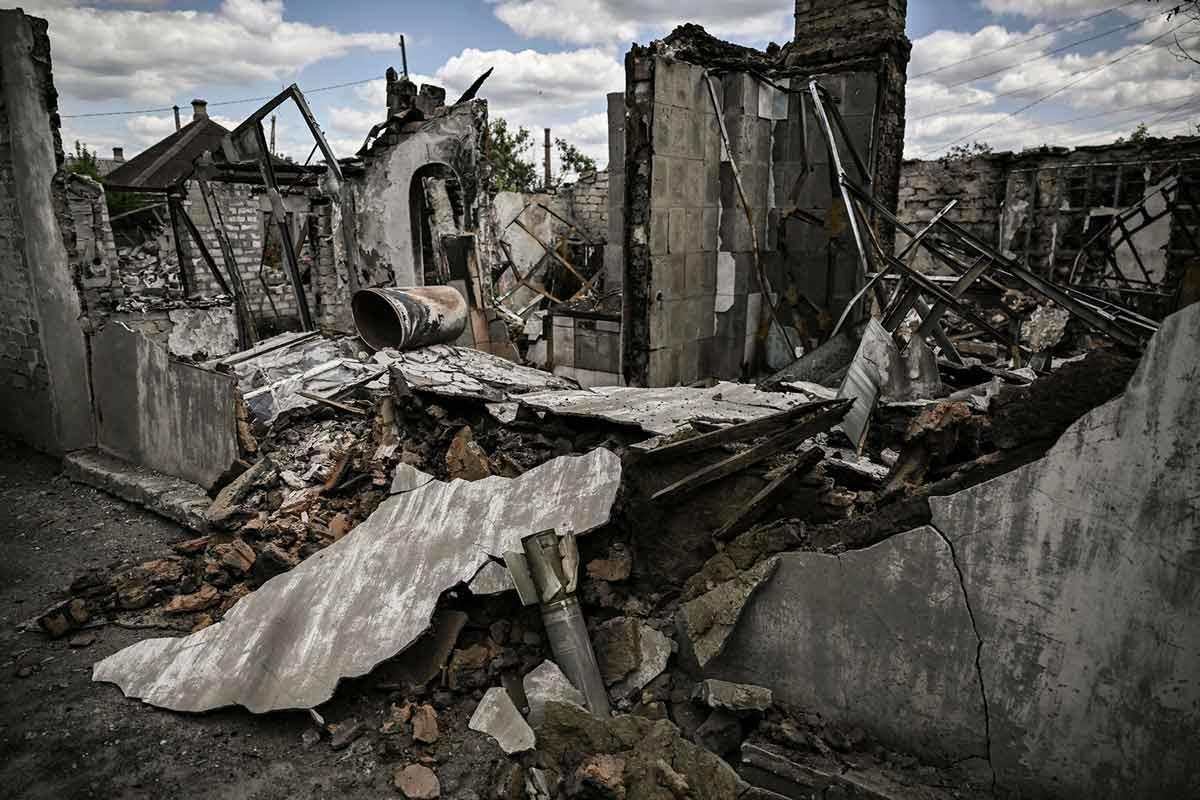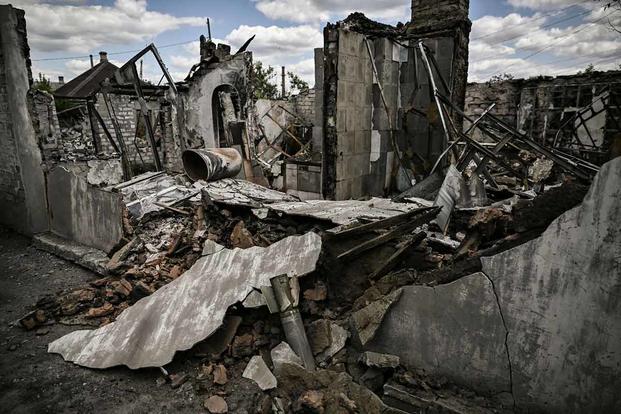

DNIPRO, Ukraine — Russia claimed near-victory Tuesday in its fight for part of an eastern Ukrainian industrial region whose capture is one of Moscow’s main stated war aims, as Ukraine acknowledged that it was waging a tough battle to keep one of its last cities there from falling.
In the fourth month of the Russian invasion, Ukraine redoubled its pleas for more heavy weaponry to parry slow and grinding advances by Moscow’s troops, which are backed by relentless artillery fire, in the contested region known as the Donbas, made up of two eastern provinces, Luhansk and Donetsk.
Moscow’s triumphal claim came from Defense Minister Sergei Shoigu, who said in televised remarks that 97% of Luhansk had been “liberated” by Russian forces.
Separately on Tuesday, a Defense Ministry spokesman, Maj. Gen. Igor Konashenkov, said some Western-supplied military equipment deployed in the country’s east, including two U.S.-provided artillery systems, had been knocked out by Russian artillery, a claim that could not be independently verified.
Crucial to Moscow’s eastern campaign is control of the industrial city of Severodonetsk, one of only two major population centers in the region that Russia has not yet been able to capture.
Ukraine said its forces were holding on in Severodonetsk — but with difficulty.
“Our armed forces are doing their utmost to defend the city,” Mayor Oleksandr Stryuk told Ukrainian television Tuesday.
President Volodymyr Zelenskyy, in his overnight address to the nation, said “fierce street fighting” was underway to keep Severodonetsk in Ukrainian hands.
Ukrainian officials say Russia is throwing more and more military resources into the fight, and Western military officials said Tuesday that Russian forces are apparently trying to isolate the city by cutting off both northern and southern approaches.
“Russia will almost certainly need to achieve a breakthrough” in the area in order to consolidate tactical gains into “operational level success” in the wider region, British military intelligence said in its latest assessment.
Zelenskyy told his compatriots that Russia also has set its sights now on Zaporizhzhia, a major southeastern city of nearly three-quarters of a million people that is a gateway to central Ukraine. It is the capital of a province of the same name, and has served as an important way station for Ukrainians fleeing from heavily battered or Russian-occupied areas, such as the fallen city of Mariupol.
“We will do everything for the defense” of Zaporizhzhia and its environs, Zelenskyy said.
Along the eastern front lines, civilian suffering has intensified as bombardment rains down on cities, towns and villages in the path of Russia’s military push.
Over the last 24 hours, Russian forces have fired on more than 20 populated areas in the Donbas provinces of Luhansk and Donetsk, the Ukrainian military said. In an operational report Tuesday, Ukraine’s military General Staff said that, in addition to aiming shellfire at towns and villages, Russia was launching airstrikes on Donetsk.
The Kremlin says it does not deliberately target civilians — which is considered a war crime — but on the ground, mainly elderly residents who have stayed behind face punishing daily barrages that force them to cower in makeshift underground shelters and endure primitive conditions reminiscent of life in pre-industrial times.
“We could never imagine a time where we would have to make fires for cooking,” said Liubov Vedeneeva, a 69-year-old who was chopping wood outside her apartment building in Lysychansk, a city not far from Severodonetsk.
Both lie on the banks of the strategic Seversky Donets River. Zelenskyy described them as “dead cities” after endless waves of Russian bombardment. But in a bid to boost troop morale, he paid an unannounced weekend visit to Ukrainian front lines in Lysychansk.
Control of the Donbas region is now Moscow’s principal declared war aim, after it failed in the war’s early days to seize the capital, Kyiv, and its forces were pushed away from Kharkiv, the country’s second-largest city.
To aid Ukraine in its fight for the region, Britain has said it will supply Ukraine with multiple-launch rocket systems. Ukraine says that is key to knocking out Russian artillery batteries that have been savaging eastern cities and towns.
Russia has warned that it will take unspecified retaliatory measures for delivery of longer-range Western weapons to Ukraine.
More than 100 days in, the war’s impact is felt differently in different parts of the country. In Odesa, the crown jewel of Ukraine’s coastal cities, a normal summer season would see its population swell with tourists. Instead, restaurants were mostly empty, and only a few beachgoers defied warnings of mines.
Other cities, though, are bursting to capacity with those escaping the eastern battle zone. In Dnipro in central Ukraine, a main waypoint for those fleeing the fighting, new arrivals are in constant need of comfort and shelter.
“We’re seeing double the numbers of people we usually have in the city,” said Petro Voytovych, who works at a restaurant that is part of World Central Kitchen, a nonprofit organization that serves meals to crisis-stricken communities.
A major Ukrainian aim is to end a Russian blockade of Ukraine’s ports on the Black Sea — a struggle that has worldwide implications because grain exports have been choked off amid the fighting. Zelenskyy said in his address that he has spoken with Turkish President Recep Tayyip Erdogan about mediating efforts to ease the blockade.
Secretary of State Antony J. Blinken has cited what he called credible reports of Russian forces pilfering grain stockpiles for attempted sale. The United Nations food agency has repeatedly warned that the Russian invasion could trigger widespread hunger around the world in coming months.
“We need a safety corridor for ships” to enable grain exports, Zelenskyy said in advance of expected talks this week in Ankara, the Turkish capital, to which Moscow, but not Kyiv, will be a party. “Turkey is now finding a format on how to provide us with guarantees.”
Russia sought Tuesday, as it has previously, to put the onus of halted grain supplies on Ukraine. Kremlin spokesman Dmitry Peskov said Ukraine needed to de-mine the waters off Odesa, the country’s main Black Sea port, and said Russia was prepared to escort commercial vessels to international waters.
Meanwhile, Ukraine’s first lady, Olena Zelenska, appealed to the international community not to turn its eyes away from the country’s lengthening struggle against the Russian invasion. In an interview to air Thursday on ABC, she said “the whole world, and Americans as well,” must refrain from getting “used to this war.”
“Yes, it is far from you, it lasts long and you can get tired of it, but please do not get used to it,” she said in remarks to ABC released Tuesday by her husband’s office. “Because if everyone gets used to it, this war will never end.”
She added that Ukraine could not cede land for peace, because “the aggressor will not stop at part of our territory — they will not stop until they destroy us.”
____
(Bulos reported from Dnipro and King from Washington. Marcus Yam contributed from Lysychansk, Ukraine.)
___
©2022 Los Angeles Times. Visit at latimes.com. Distributed by Tribune Content Agency, LLC.
© Copyright 2022 The Los Angeles Times. All rights reserved. This material may not be published, broadcast, rewritten or redistributed.
